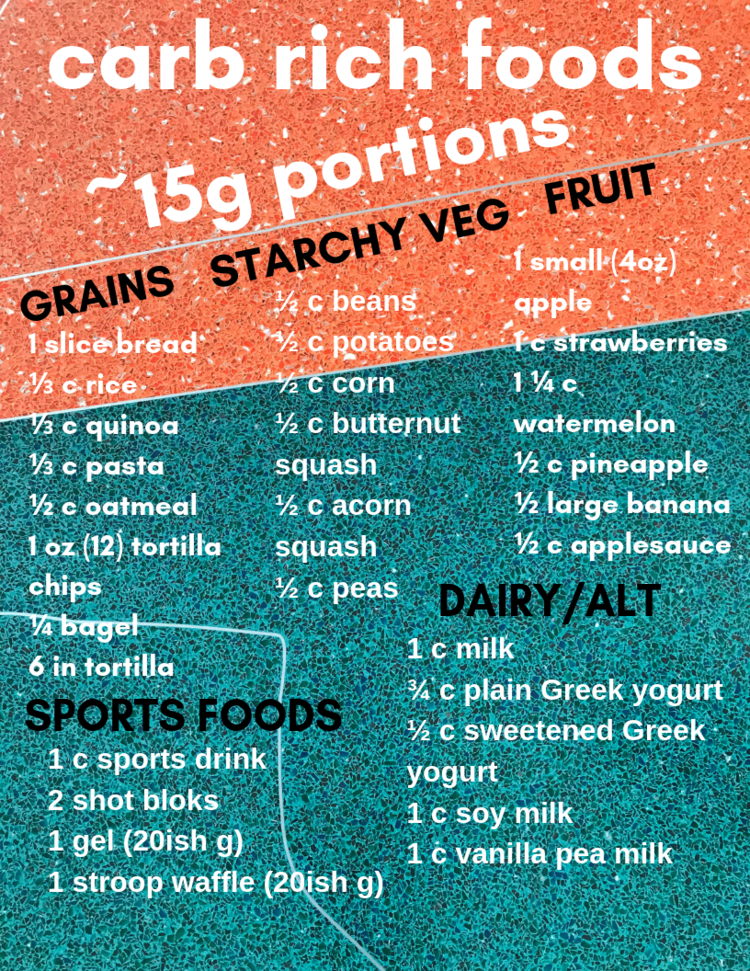In the ketogenic diet craze era, there’s a plethora of misinformation regarding the total health benefits of carbohydrates as well as their necessity for optimal athletic performance. Whether you’re a CrossFit competitor, a boulderer, or a marathon runner, consuming carbohydrates will absolutely maximize your athletic potential.
Dietary carbohydrates are actually not required by the body to function. Gasp! Yes! We can actually make all the glucose we need from protein and fat. There’s a growing number of keto fans (ultra high fat, low carb, moderate protein diet) who believe that because we don’t necessarily need them, we shouldn’t bother to eat them, or at least eat very few carbs. It’s true that most Americans consume too many SIMPLE carbohydrates— low fiber, high sugar carbohydrates like chips, soda, packaged sweets, etc. However, most Americans’ carbohydrate needs are nowhere near that of a highly active individual. Someone exercising for 30 minutes per day, 5 days per week per American Heart Association guidelines will have much lower carbohydrate needs than an athlete.
If you are an athlete, someone who often pushes yourself to physical limits on a weekly basis for personal records or harder sends, carbs will absolutely help you reach your potential. Low-carbohydrate, high-fat diets are not as energy efficient as high-carbohydrate diets for athletes. Carbohydrates provide more energy for a given amount of oxygen than fat, so if you’re fat adapted, you’ll need more oxygen to sustain a given pace than when burning carbs as the primary fuel source. If you can’t access enough oxygen to sustain your current effort, performance will decline. Least I forget to mention that if you enjoy eating carbs, an ultra-low carb diet is likely unsustainable.
During exercise, carbohydrate is the predominant fuel source, and most of these carbs used are coming from the muscle and liver. Amazingly, muscles can store anywhere from 300-400 grams of carbs, while the liver can store 75-100 grams of carbs! As exercise demands increase (say, in an endurance activity like running over an hour) and the muscle glycogen (stored sugar) stores decrease, blood glucose (sugar) becomes an increasingly important carb source. When the liver can’t keep up with the muscle demands during prolonged exercise, blood sugar drops. It’s important to provide the muscle with carbohydrates via feeding to produce energy and keep up with the demands of exercise, or you’ll burn more fat (less efficient) and likely reduce performance. Additionally, some evidence even suggests low muscle glycogen (stored glucose) may reduce muscle protein synthesis, meaning you might not repair and rebuild muscle as efficiently.
During moderate intensity exercise (~65% of max VO2 max) muscle glycogen accounts to about HALF of the energy to sustain the activity. For high-intensity exercise (85% of VO2 max), it accounts for about 67% of the energy to sustain the activity! Needless to say, the body is crushing carbs to sustain activity.
Adequate carbohydrate intake outside of exercise can fill up the glycogen stores in the muscle and liver. This is especially important between hard training sessions/competitions.
So, how many carbohydrates should you consume daily? This is entirely dependent on the rigor and frequency of training sessions, but below is a range for trained athletes.
Very light training (low-intensity or skill based exercise)— 3-5 g/kg body weight/day
Moderate intensity training
(60 min/day, heart rate elevated)— 5-7 g/kg body wt/day
Mod to high-intensity endurance exercise
(1-3 hr/day)— 6-10 g/kg body wt/day
Mod to high intensity exercise
(4-5 hr/day)— 8-12 g/kg body wt/day
For example, an 85kg runner training for a marathon (>50 miles/week running, 2 speed-work days & 1 long run, 2 weight sessions/week: exercising 7 days/week) may need between 510-850g of carbohydrates per day!
As another example, a 60kg runner & climber (20 miles/week running easy pace, two, 120min bouldering sessions and one 60 min endurance rope climbing session/week, totaling 6 days/week) may need 180-300g of carbohydrates per day.
To put grams of carbohydrates in perspective, check out the carb content of common carb-rich foods.

Carbohydrate needs can ebb and flow between high training and low training days, in addition to carb distribution throughout the day surrounding exercise. Not mentioned in this article are the quality of carbohydrates consumed definitely matters. Given this is Carbs 101, I’ll discuss these concepts further in later articles.
Sources
Burke LM, Ross Megan, et al. Low carbohydrate, high fat diet impairs exercise economy and negates the performance benefit from intensified training in elite race walkers. J Physiol. 2017; 595(9): 2785–2807.
Burke LM, Hawley JA, Wong S, Jeukendrup AE. Carbohydrates for training and competition. J Sports Ci. 2011; 29 (suppl 1): 17S-27S
Jacobs KA, Sherman WM. The efficacy of carbohydrate supplementation and chronic high carbohydrate diets for improving endurance performance. Int J Sport Nutr. 1999;9(1):92-115.
Hargreaves M. Exercise physiology and metabolism. In: Burke L, Deakin V, eds. Clinical Sports Nutrition. 4th ed. Sydney, Australia: MCGraw-Hill; 2010;1-15.
Thomas DT, Erdman KA, Burke LM. Position of the Academy of Nutrition and Dietetics, Dietitians of Canada, and the American College of Sports Medicine: nutrition and athletic performance. J Acad Nutr Diet. 2016;116(3):501-528



